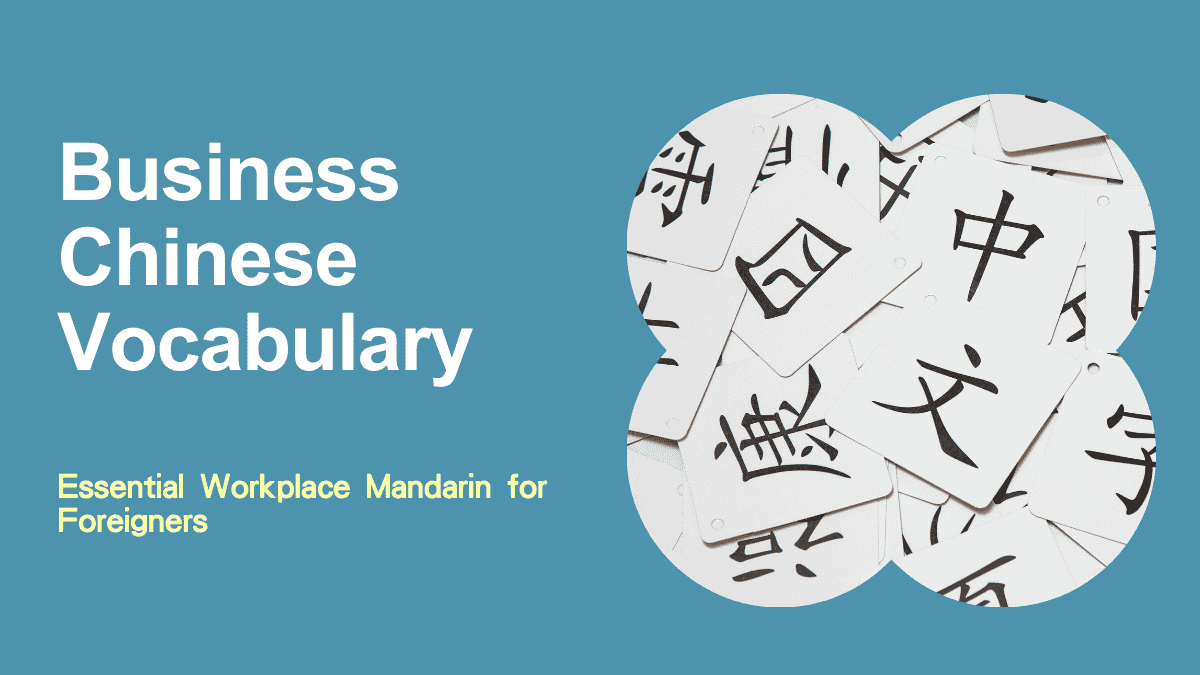Just started working in a Chinese-speaking environment, but can’t understand what your colleagues are saying? Still struggling with how to ask for leave, attend meetings, or write emails in Chinese? Mastering business Chinese vocabulary is the first step to unlocking effective communication in the workplace. This article is designed for beginner Mandarin learners, helping you understand the most common office phrases and sentence patterns in Chinese, so you can quickly improve your business Chinese skills and confidently face workplace challenges!

1. Why Learn Business Chinese Vocabulary?
Business Chinese vocabulary refers to commonly used words and phrases in the workplace or business settings. For foreigners new to a Chinese-speaking work environment, these terms help with daily communication and demonstrate professionalism and politeness.
Benefits of learning business Chinese vocabulary include:
-
Improving work efficiency and collaboration
-
Reducing cultural misunderstandings and language barriers
-
Showing proper workplace etiquette and gaining trust
-
Integrating more quickly into the Taiwanese or Chinese work culture
2. Common Chinese Workplace Phrases: Office Scenarios
Below are some common office situations with corresponding business Chinese vocabulary and example sentences, along with pinyin to help you fully grasp their usage.
▶Learn more:Best Way to Learn Mandarin: Top Strategies, Tips & Resources That Actually Work
✦ Asking for Leave
Vocabulary:
請假 (qǐng jià) – to ask for leave
病假 (bìng jià) – sick leave
事假 (shì jià) – personal leave
特休 (tè xiū) – annual leave
補休 (bǔ xiū) – compensatory leave
Examples:
我想請一天事假,請問可以嗎?
Wǒ xiǎng qǐng yì tiān shì jià, qǐng wèn kě yǐ ma?
(I would like to take one day of personal leave. Is that okay?)
他今天請病假,不會來上班。
Tā jīn tiān qǐng bìng jià, bú huì lái shàng bān.
(He took sick leave today and won’t be coming to work.)
✦ Meetings
Vocabulary:
開會 (kāi huì) – to hold a meeting
會議 (huì yì) – meeting
簡報 (jiǎn bào) – presentation
報告 (bào gào) – report
Examples:
下午三點有一個會議,請準時參加。
Xià wǔ sān diǎn yǒu yí ge huì yì, qǐng zhǔn shí cān jiā.
(There’s a meeting at 3 p.m. Please attend on time.)
我們需要準備一份簡報給客戶。
Wǒ men xū yào zhǔn bèi yí fèn jiǎn bào gěi kè hù.
(We need to prepare a presentation for the client.)

✦ Writing Emails / Workplace Communication
Vocabulary:
發信 (fā xìn) – to send an email
附件 (fù jiàn) – attachment
主旨 (zhǔ zhǐ) – subject line
回覆 (huí fù) – to reply
Examples:
我已經把報告發到你的信箱了。
Wǒ yǐ jīng bǎ bào gào fā dào nǐ de xìn xiāng le.
(I’ve already sent the report to your email.)
請參考附件的資料。
Qǐng cān kǎo fù jiàn de zī liào.
(Please refer to the attached file.)
✦ Tasks and Progress
Vocabulary:
負責 (fù zé) – to be responsible for
進度 (jìn dù) – progress
回報 (huí bào) – to report back
協助 (xié zhù) – to assist
Examples:
這個任務由你來負責。
Zhè ge rèn wù yóu nǐ lái fù zé.
(You will be responsible for this task.)
我明天會把進度回報給主管。
Wǒ míng tiān huì bǎ jìn dù huí bào gěi zhǔ guǎn.
(I’ll report the progress to the manager tomorrow.)
3. Common Mistakes to Avoid When Learning Business Chinese Vocabulary

Beginner learners often make these common mistakes when studying business Chinese:
-
Confusing verbs and nouns: For example, “報告” can be both a verb and a noun. Context is key.
-
Using overly casual language: In the workplace, avoid informal speech. Add polite phrases like “請” (please) or “麻煩您” (may I trouble you) to sound respectful.
-
Ignoring cultural habits: For instance, in Taiwanese offices, it’s common to end emails with “辛苦了” (thank you for your hard work) to show care.
4. 4 Tips for Learning Business Chinese Vocabulary

-
Role-play scenarios: Practice dialogues for common situations like meetings or asking for leave.
-
Make vocabulary flashcards: Use a three-column format: Chinese – Pinyin – English.
-
Watch Chinese business videos: Improve your listening skills and language feel.
-
Join a language center course: Learn business Chinese and cultural etiquette systematically.
5. FAQ|Common Questions About Business Chinese Vocabulary
Business Chinese VocabularyQ1: What’s the difference between business Chinese vocabulary and general Chinese?
A: Business Chinese focuses more on politeness, precision, and understanding workplace culture, making it different from everyday conversational Chinese.
Business Chinese VocabularyQ2: I’m a beginner—can I use these words right away?
A: Absolutely! These are basic, practical phrases perfect for beginners to start using at work.
Business Chinese VocabularyQ3: Are there any recommended online learning resources?
A: We recommend joining Oh Young Language Center’s Business Chinese courses, where professional teachers guide you in learning and applying the language in real situations.
6. Conclusion: Stand Out in the Workplace with Business Chinese!
Business Chinese vocabulary is your first step toward success in a Chinese-speaking workplace. Don’t be afraid to speak up! Whether it’s taking leave, joining meetings, writing emails, or reporting progress, these words will help you express yourself fluently and work smoothly with your colleagues.

If you want to improve quickly, Oh Young Language Center offers business Chinese courses specifically designed for foreign beginners. These courses include real-life scenarios, speaking practice, and cultural guidance to help you confidently speak professionally and communicate.
Join us now and start speaking fluent business Chinese today!












